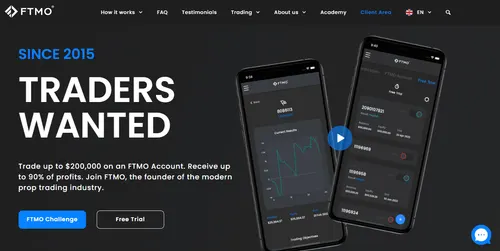Our partner, XM, lets you access a free demo account to apply your knowledge.
No hidden costs, no tricks.

Millions of traders enter the capital markets with the goal of growing their accounts and building a fortune over time. This can take years, if not decades to materialize. Typically, beginner traders improve along the way while losing money in the process.
On the other hand, certain experienced traders may not have access to large amounts of capital, but do not lack the knowledge of the market. What these traders often do is they register with proprietary trading firms, or a prop firm, and apply for funding from the firm.
For example, a trader may apply to receive $50,000 in funding, where they get to keep 80% of the profits they generate in exchange for adhering to the requirements and limitations set by the prop firm.
Prop trading is a great way of increasing buying power and getting funded for an affordable monthly fee.
The prop trading market is not strictly regulated, which makes it possible for major prop firms to offer their services globally.
If you are a beginner trader and would like to know more about what a prop firm is and how it works, this Investfox guide is for you.
Proprietary trading firms, or prop firms, allow professional traders to prove their expertise using a demo account as they are assigned a trading task which includes a profit target and drawdown limitations. If the trader successfully completes the audition, the prop firm will proceed with their funding.
Typically, funding tiers among prop firms ranges between $10,000 and $300,000, with some prop firms offering scaling options into the millions.
Here’s how a typical prop firm works:

To better understand how prop firms work, let’s look at an example of one of the top-rated prop firms - FTMO. Founded in 2015 in the Czech Republic, FTMO offers various account tiers, which range from $10,000 to $200,000, with the ability to scale up the account to as much as $2 million.
FTMO offers MetaTrader 4 to its clients who can trade forex, commodities, indices, and crypto with the firm. The firm also allows traders to use different currencies for their accounts.
When traders pass the audition at FTMO, they can choose the funding level of their choice and start trading. The profit target at the firm is 10% for funded traders, which means that for a trader that has obtained a funded account of $10,000, their profit target would be $1,000.
FTMO allows its clients to keep 90% of the profits they generate.
Prop trading has its fair share of advantages and disadvantages and traders should consider these factors carefully to decide whether applying for a prop firm is the right course of action for their financial objectives.
Our partner, XM, lets you access a free demo account to apply your knowledge.
No hidden costs, no tricks.
Proprietary trading firms (prop firms) engage in financial markets using their own capital. Traders, often funded by the firm, aim to generate profits. Firms may provide leverage, technology, and training, sharing profits with traders based on agreed-upon terms.
Yes, proprietary trading involves inherent risks. Traders use the firm's capital, and profits/losses impact both the trader and the firm. Market fluctuations, leverage, and strategy risks contribute to the overall risk profile, making it a dynamic and potentially high-risk activity.
Proprietary trading firms are subject to some degree of regulation, but these regulations are considerably more lax than those of licensed brokerages and other financial firms.